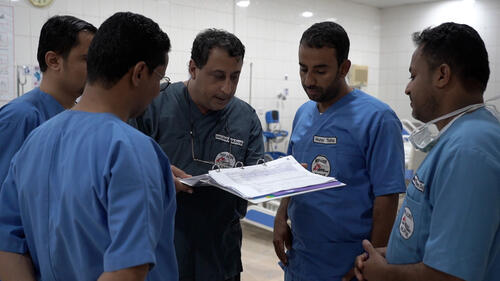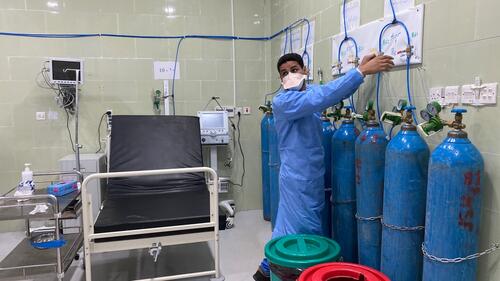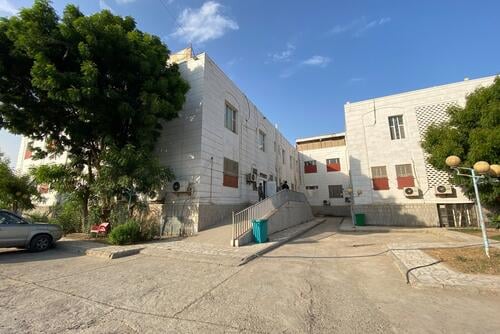Since the intensity of conflict has decreased in Aden, Yemen, and the subsequent reduction of people facing violence-related trauma, Médecins Sans Frontières (MSF) has concluded our 12-year project at the Aden trauma centre. We will now refocus our activities in Aden to provide medical care for people’s most pressing needs.
Providing advanced trauma care during war
Over the past 12 years, MSF teams in Aden have treated and rehabilitated thousands of people severely injured by the war in Yemen, providing more than 65,000 emergency consultations and close to 68,000 surgical procedures. Most patients suffered from open fractures, burn injuries, or sustained injuries from gunshots and explosives.
As the conflict in Yemen deepened during the battle for Aden in 2015, activities at the Aden trauma centre intensified. During this time, while the centre treated a mass influx of patients with severe war wounds, our teams also ran advanced emergency post and surgical mobile clinics in the city to stabilise war-wounded individuals and improve their chances of survival.
“The Aden trauma centre has been the only specialised acute trauma hospital in the area and served as an epicentre for treating patients. Some of our patients came from very far places, sometimes traveling for days in difficult conditions to seek free medical care,” says Olivier Marteau, MSF’s deputy head of mission in Yemen.

In 2018, following the Hodeidah offensive, MSF teams increased the hospital's capacity from 86 to 104 beds to respond to another influx of war-wounded patients.
In 2020, conflict escalated in southern Hodeidah, while the hospital in Aden was receiving a high workload of severe trauma cases, where a person had multiple traumatic injuries, that required specialised, intensive and multidisciplinary care.
Ryadh Mohammed Ahmed Saleh, 24, was among the patients admitted to the Aden trauma centre at this time. Originating from Abyan, a governate neighbouring Aden, he was referred to Aden for a serious gunshot wound. At the centre, he received colostomy surgery, which saved his life.
“The gunshot wound was severe; I never thought I would be alive today,” says Ryadh. “When I got to the hospital, I was in excruciating pain. The doctors reassured me that I would be fine. Despite a few complications with the colostomy, I am grateful for my life today and for the medical support I received,” he says.
The gunshot wound was severe; I never thought I would be alive today.Ryadh Mohammed Ahmed Saleh, a patient at the trauma centre in 2020
To reduce the constant and high pressure for the medical, logistic and operational teams at the Aden trauma centre, in 2018 MSF opened a trauma field hospital in Mocha, a city located between Hodeidah and Aden, as conflict escalated on the west coast of Yemen.
“From April to August 2020, the Aden trauma centre received 493 patients from the frontlines on the western coast, mostly injured by gun shots, landmines or bombing,” says Marteau. “Around 20 ambulances per day were transporting patients from Hodeidah and the surrounding area to Aden, a six-hour drive to reach lifesaving healthcare.”
The opening of Mocha hospital released the intense pressure on the centre and allowed patients to be treated more quickly. On the other hand, it also enabled the centre to focus on more complex cases, and expand its admission criteria, including road-traffic accidents, other trauma-related injuries, as well as COVID-19 cases.
Running the only COVID-19 centre for southern Yemen
After the first case of COVID-19 was confirmed in April 2020 in Yemen, MSF opened the first and only dedicated treatment centre for the whole of southern Yemen. For months, our teams faced immense challenges in facilitating the entrance of supplies and medical equipment, while the disease spread very quickly.
“In the first weeks, we received hundreds of patients. Many arrived at the centre already suffering from acute respiratory distress syndrome,” says Dr Youssef Nagwan, who has been working with MSF in Aden since 2015. “Our teams were working around the clock to provide the best treatment we could, but we were overwhelmed.”

In 2021, our teams saw a dramatic influx of critically ill COVID-19 patients requiring hospitalisation in Aden. After six years of war, Yemen’s healthcare system was crippled and the capacity to treat people in intensive care was limited. MSF started to provide support to the COVID-19 treatment centre in Al-Sadaqa hospital, with the support of the Ministry of Public Health and Population.
Refocusing activities to meet new medical needs
In 2023, there was a further decline in political violence in Yemen, which dropped to the lowest level since the start of the current conflict in 2015, with Ansar Allah and the internationally recognised government maintaining an unofficial truce since the end of the UN-mediated truce in October 2022.
As a result, our teams in Aden saw a decrease in conflict-related trauma cases, while treating an increasing number of patients injured by domestic and road accidents.
MSF is now assessing the medical gaps and priority needs in Aden in coordination the Ministry of Health. In 2025, MSF aims to refocus our activities in Aden to provide new medical services for people most in need.
The new medical activity is under assessment and will be presented to the Ministry of Health in the second half of 2025. This transition period allows for renovations that MSF will undertake in the hospital. In the meantime, MSF, as a humanitarian organisation with expertise in emergencies and crises, remains fully prepared to intervene and respond to any medical emergencies that may arise.
The medical and humanitarian needs in Aden and across Yemen remain high. MSF is committed to the needs of people in Yemen, where we have been working since 1986. Today, MSF teams work in 13 hospitals across 13 governorates, providing support to more than 12 health facilities across the country.



